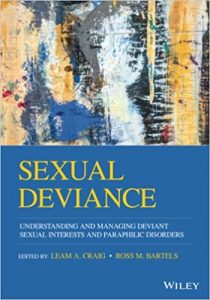by rbartels | Jun 30, 2022 | Publications
In Ju ne 2021, Phil Willmot had the following book chapter published:
ne 2021, Phil Willmot had the following book chapter published:
Willmot, P. & Utting, E. (2021). Forensic Psychology in Mental Health and Social Care. In D. Crighton & G Towl (Eds.) Forensic Psychology (3rd Edition). Wiley.
by rbartels | Jun 30, 2022 | Publications
In June 2021, Amanda Roberts (and colleagues) had the following paper published:
Sharman, S., Roberts, A., Bowden-Jones, H., & Strang, J,. (2021). Gambling and Covid-19: Initial Findings from a UK Sample. International Journal of Mental Health and Addiction. Open Access
Abstract
In response to the COVID-19 pandemic, the UK Government placed society on ‘lockdown’, altering the gambling landscape. This study sought to capture the immediate lockdown-enforced changes in gambling behaviour. UK adults (n = 1028) were recruited online. Gambling behaviour (frequency and weekly expenditure, perceived increase/decrease) was measured using a survey-specific questionnaire. Analyses compared gambling behaviour as a function of pre-lockdown gambling status, measured by the Brief Problem Gambling Scale. In the whole sample, gambling participation decreased between pre- and during-lockdown. Both gambling frequency and weekly expenditure decreased during the first month of lockdown overall, but, the most engaged gamblers did not show a change in gambling behaviour, despite the decrease in opportunity and availability. Individuals whose financial circumstances were negatively affected by lockdown were more likely to perceive an increase in gambling than those whose financial circumstances were not negatively affected. Findings reflect short-term behaviour change; it will be crucial to examine, at future release of lockdown, if behaviour returns to pre-lockdown patterns, or whether new behavioural patterns persist.
by rbartels | Jun 30, 2022 | Publications
On the 6th May 2021, Ross Bartels published a new book (co-edited with Prof Leam Craig) entitled ‘Sexual Deviance: Understanding and Managing Deviant Sexual Interests and Paraphilic Disorders’.
 The book provides a up-to-date understanding of the development, assessment, and treatment of sexual deviance and paraphilic disorders. It contains 20 chapters written by different authoritative academics and practitioners. One of the chapters on sexual fantasising is written by Ross himself. Also, one chapter (on necrophilia and somnophilia) was co-authored by PhD student Elizabeth Deehan!
The book provides a up-to-date understanding of the development, assessment, and treatment of sexual deviance and paraphilic disorders. It contains 20 chapters written by different authoritative academics and practitioners. One of the chapters on sexual fantasising is written by Ross himself. Also, one chapter (on necrophilia and somnophilia) was co-authored by PhD student Elizabeth Deehan!
You can find more details on Amazon – https://www.amazon.co.uk/Sexual-Deviance-Understanding-Assessing-Paraphilic/dp/1119705835
by rbartels | Jun 30, 2022 | Publications
In April 2021, Amanda Roberts (and colleagues) published a paper examining gambling among residents of a transitional housing service.
Landon, L., Will, U., Bellringer, M., Mauchline, L., Roberts, A. (2021). The bad things that happen are kind of good things”: Exploring gambling among residents of a transitional housing service”. International Journal of Mental Health and Addiction. Published online 31st March 2021. https://rdcu.be/chRs8
by rbartels | Jun 30, 2022 | Publications
I n early 2021, Amanda Roberts published the following papers with her colleagues:
n early 2021, Amanda Roberts published the following papers with her colleagues:
Roberts, A., Rogers, J., Sharman, S., Melendez-Torres, G.J., Cowlishaw, S (2021). Gambling problems in primary care: A systematic review and synthesis. Addiction Research & Theory, 29, 454-468.
Sharman, S., Roberts, Bowden-Jones, H., & Strang, J,. (2021). Gambling, COVID-19, and Lockdown: Depression, Stress and Anxiety. Frontiers in Psychiatry, section Addictive Disorders. https://doi.org/10.3389/fpsyt.2021.621497
This article can be accessed at: Frontiers | Gambling in COVID-19 Lockdown in the UK: Depression, Stress, and Anxiety | Psychiatry (frontiersin.org)
by rbartels | Jun 30, 2022 | Publications
Georgina has published an new paper in the Jan/Feb issue of ‘Applied Cognitive Psychology’ entitled “Individual differences in face and voice matching abilities: The relationship between accuracy and consistency”
Abstract
Deciding whether two different face photographs or voice samples are from the same person represent fundamental challenges within applied settings. To date, most research has focussed on average performance in these tests, failing to consider individual differences and within-person consistency in responses. Here, participants completed the same face (Experiment 1) or voice matching test (Experiment 2) on two separate occasions, allowing comparison of overall accuracy across the two timepoints as well as consistency in trial-level responses. In both experiments, participants were highly consistent in their performances. In addition, we demonstrated a large association between consistency and accuracy, with the most accurate participants also tending to be the most consistent. This is an important result for applied settings in which organisational groups of super-matchers are deployed in real-world contexts. Being able to reliably identify these high performers based upon only a single test informs regarding recruitment for law enforcement agencies worldwide.
by rbartels | Jun 30, 2022 | Publications
In Nov 2020, Hannah Merdian (and colleagues) had a paper published in Psychology, Crime, and Law. The paper examines the feasibility of integrating Hannah’s CSEM pathways tool into treatment.
Merdian, H. L., Perkins, D. P., McCashin, D., & Stefanovic, J. (2020). Integrating structured individual offending pathway analysis into group treatment for individuals who have accessed, shared, and/or distributed child sexual exploitation material: A feasibility study and preliminary outcome evaluation. Update: The paper is now in print form
Abstract
The Child Sexual Exploitation Material Pathways Tool (CPT) is a case formulation tool that guides a systematic exploration of the learning history, current personal situation, and offending behaviour of individuals who have been arrested, cautioned, and/or sentenced for accessing, downloading, distributing, and/or sharing of child sexual exploitation material. Based on the RE-AIM principles, a feasibility study was conducted to test the integration of the CPT as part of a community treatment group in comparison to treatment-as-usual. Based on qualitative feedback from the participants and group facilitators, the study evidenced that participants (and service staff) can be successfully recruited for this intervention, that the intervention has perceived positive effects, and that it can be integrated into treatment-as-usual. The study also highlighted critical issues in the quantitative evaluation of feasibility studies in a forensic context and with regards to the CPT specifically. Limitations of the study are the small sample size and the number of drop-outs over time. Findings are discussed with regards to planned revisions to the CPT and research developments towards a randomised controlled trial.
by rbartels | Jun 30, 2022 | Publications
In Dec 2020, Amanda Roberts (and colleagues) published a new paper entitled “Social impact bonds in the UK homeless sector: Perspectives of front-line link workers” in the ‘Housing, Care and Support’ journal. The abstract is below:
Purpose
Social impact bonds (SIBs) have become a favoured way to fund public services, including housing, prison and homelessness projects, in an era of austerity. In a growing critical literature on SIBs, a largely absent voice is that of the link worker. This paper aims to focus on the views of link workers in a SIB funded project which works with long-term entrenched rough sleepers in the East of England.
Design/methodology/approach
Interviews with link workers were conducted with a thematic analysis echoing many of the views expressed in the critical literature not only about the problems but also some of the advantages that SIBs offer to this type of project.
Findings
Three key themes were discomfort with the funding mechanism; flexible and innovative interventions that SIBs make possible; and problems with the outcome measures that trigger payments. This study concludes that if SIBs are to achieve their promise of providing funding which leads to effective solutions to deeply ingrained social problems, there needs to be more careful evaluation of their true benefits in comparison to publicly funded projects, adoption of more appropriate and project-specific outcome measures and a much clearer explanation and justification of the way in which SIB funding works.
Originality/value
Few studies have specifically explored the perceptions of front-line link workers in the homelessness sector. This study highlights not only the concerns but also the benefits associated with the use of SIB as a funding mechanism within the homelessness sector.
by rbartels | Jun 30, 2022 | Publications
 Congrats to Matthew King-Parker (PhD student) who published a review article on the “Psychology of Domestic Burglary” in the December (2020) issue of the PsyPAG Quarterly.
Congrats to Matthew King-Parker (PhD student) who published a review article on the “Psychology of Domestic Burglary” in the December (2020) issue of the PsyPAG Quarterly.
PsyPAG is a national organisation (funded by the BPS) for all psychology postgraduates based at UK Institutions, and The Quarterly is their official journal.
by rbartels | Jun 30, 2022 | Publications
In August, Ross (and graduate Maja Henek) published an open-access paper (in the SOTRAP journal) examining whether sexual fantasies about adult women dressed as schoolgirls is associated with child sexual abuse proclivity.
Henek, M., & Bartels, R. M. (2020). Adult-as-schoolgirl sexual fantasies: Investigating their relationship with sexual interest in children within a male sample. Sexual Offending: Theory, Research, & Prevention, 15, https://doi.org/10.5964/sotrap.3069
 ne 2021, Phil Willmot had the following book chapter published:
ne 2021, Phil Willmot had the following book chapter published:
 The book provides a up-to-date understanding of the development, assessment, and treatment of sexual deviance and paraphilic disorders. It contains 20 chapters written by different authoritative academics and practitioners. One of the chapters on sexual fantasising is written by Ross himself. Also, one chapter (on necrophilia and somnophilia) was co-authored by PhD student Elizabeth Deehan!
The book provides a up-to-date understanding of the development, assessment, and treatment of sexual deviance and paraphilic disorders. It contains 20 chapters written by different authoritative academics and practitioners. One of the chapters on sexual fantasising is written by Ross himself. Also, one chapter (on necrophilia and somnophilia) was co-authored by PhD student Elizabeth Deehan!
